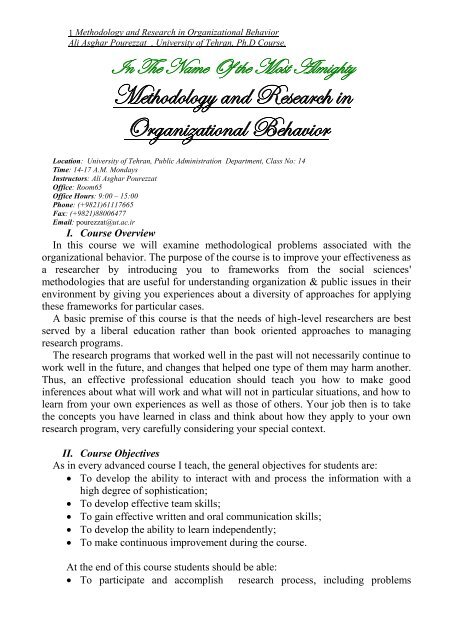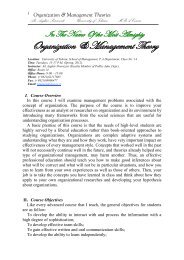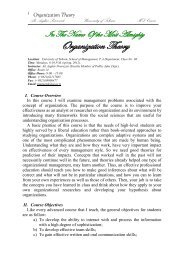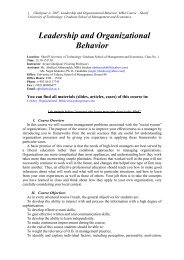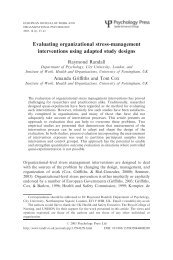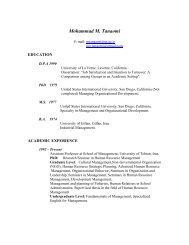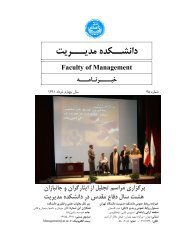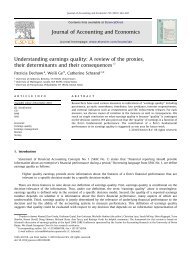Methodology and Research in Organizational Behavior
Methodology and Research in Organizational Behavior
Methodology and Research in Organizational Behavior
You also want an ePaper? Increase the reach of your titles
YUMPU automatically turns print PDFs into web optimized ePapers that Google loves.
1 <strong>Methodology</strong> <strong>and</strong> <strong>Research</strong> <strong>in</strong> <strong>Organizational</strong> <strong>Behavior</strong><br />
Ali Asghar Pourezzat , University of Tehran, Ph.D Course.<br />
In The Name Of the Most Almighty<br />
<strong>Methodology</strong> <strong>and</strong> <strong>Research</strong> <strong>in</strong><br />
<strong>Organizational</strong> <strong>Behavior</strong><br />
Location: University of Tehran, Public Adm<strong>in</strong>istration Department, Class No: 14<br />
Time: 14-17 A.M. Mondays<br />
Instructors: Ali Asghar Pourezzat<br />
Office: Room65<br />
Office Hours: 9:00 – 15:00<br />
Phone: (+9821)61117665<br />
Fax: (+9821)88006477<br />
Email: pourezzat@ut.ac.ir<br />
I. Course Overview<br />
In this course we will exam<strong>in</strong>e methodological problems associated with the<br />
organizational behavior. The purpose of the course is to improve your effectiveness as<br />
a researcher by <strong>in</strong>troduc<strong>in</strong>g you to frameworks from the social sciences'<br />
methodologies that are useful for underst<strong>and</strong><strong>in</strong>g organization & public issues <strong>in</strong> their<br />
environment by giv<strong>in</strong>g you experiences about a diversity of approaches for apply<strong>in</strong>g<br />
these frameworks for particular cases.<br />
A basic premise of this course is that the needs of high-level researchers are best<br />
served by a liberal education rather than book oriented approaches to manag<strong>in</strong>g<br />
research programs.<br />
The research programs that worked well <strong>in</strong> the past will not necessarily cont<strong>in</strong>ue to<br />
work well <strong>in</strong> the future, <strong>and</strong> changes that helped one type of them may harm another.<br />
Thus, an effective professional education should teach you how to make good<br />
<strong>in</strong>ferences about what will work <strong>and</strong> what will not <strong>in</strong> particular situations, <strong>and</strong> how to<br />
learn from your own experiences as well as those of others. Your job then is to take<br />
the concepts you have learned <strong>in</strong> class <strong>and</strong> th<strong>in</strong>k about how they apply to your own<br />
research program, very carefully consider<strong>in</strong>g your special context.<br />
II. Course Objectives<br />
As <strong>in</strong> every advanced course I teach, the general objectives for students are:<br />
To develop the ability to <strong>in</strong>teract with <strong>and</strong> process the <strong>in</strong>formation with a<br />
high degree of sophistication;<br />
To develop effective team skills;<br />
To ga<strong>in</strong> effective written <strong>and</strong> oral communication skills;<br />
To develop the ability to learn <strong>in</strong>dependently;<br />
To make cont<strong>in</strong>uous improvement dur<strong>in</strong>g the course.<br />
At the end of this course students should be able:<br />
To participate <strong>and</strong> accomplish research process, <strong>in</strong>clud<strong>in</strong>g problems
2 <strong>Methodology</strong> <strong>and</strong> <strong>Research</strong> <strong>in</strong> <strong>Organizational</strong> <strong>Behavior</strong><br />
Ali Asghar Pourezzat , University of Tehran, Ph.D Course.<br />
recognition, develop<strong>in</strong>g their def<strong>in</strong>itions, monitor<strong>in</strong>g their causes <strong>and</strong> effects,<br />
suggestion of solution-oriented alternatives, consequence prediction <strong>and</strong><br />
offer<strong>in</strong>g a new proposal <strong>in</strong> order to direct<strong>in</strong>g future researches;<br />
To po<strong>in</strong>t out <strong>and</strong> discuss how certa<strong>in</strong> social researches can be conducted;<br />
To identify <strong>and</strong> analyze personal biases <strong>and</strong> how they could be avoided<br />
dur<strong>in</strong>g the process of research;<br />
To apply analytical <strong>and</strong> problem-solv<strong>in</strong>g skills <strong>in</strong> the application of<br />
organizational research about leadership, decision-mak<strong>in</strong>g, communication<br />
<strong>and</strong> group dynamics impacts <strong>and</strong> their implications <strong>in</strong> social life;<br />
To underst<strong>and</strong> the nature, scope <strong>and</strong> historical literature of research <strong>and</strong><br />
methodology;<br />
To underst<strong>and</strong> the various schools of thought that have constructed the<br />
theories <strong>and</strong> practices of management research methodologies;<br />
To see, underst<strong>and</strong> <strong>and</strong> appreciate theories, facts, events, issues, problems,<br />
<strong>and</strong> alternative solutions from more than a s<strong>in</strong>gle perspective.<br />
III. Prerequisite Text<br />
De Vaus, D. A. 1995. Surveys <strong>in</strong> Social <strong>Research</strong>, 4th edition, UCL Press,<br />
Taylor <strong>and</strong> Francis. (Translated By Naebi).<br />
Quivy, Raymond e Luc van e Van Campenhoudt. 1988. Manual de<br />
Investigação em Ciências Sociais. Lisboa: Gradiva.( Translated By<br />
Nikgohar).<br />
IV. Required book<br />
Hatch, Mary Jo. 2006. Organization Theory. Oxford University Press.<br />
Seale, Clive; Gobo, Giampietro; Gubrium, Jaber F. Silverman, David (Eds.) .<br />
2004. Qualitative <strong>Research</strong> Practice, Sage Publications.<br />
<br />
Required Articles<br />
ی آگزی<br />
ی سی ی ی<br />
ی.<br />
برای توسعھ کیفی<br />
پژوھشگاه علوم انسانی و مطالعات فرھنگی و دانشگاه صنعتی شریف.<br />
ی<br />
ی<br />
ی<br />
<br />
<br />
.(١٣٨۶) .<br />
Aronoff, Craig. 1975. “The rise of the behavioral perspective <strong>in</strong> selected<br />
general management textbooks: an empirical <strong>in</strong>vestigation through<br />
content analysis”. Academy of Management Journal; 18: 753-768<br />
Bartunek, Jean M; Bobko, Philip; Venkatraman, N. 1993. “Toward<br />
<strong>in</strong>novation <strong>and</strong> diversity <strong>in</strong> management research methods”. Academy of<br />
Management Journal; 36(6): 1362-1373.
3 <strong>Methodology</strong> <strong>and</strong> <strong>Research</strong> <strong>in</strong> <strong>Organizational</strong> <strong>Behavior</strong><br />
Ali Asghar Pourezzat , University of Tehran, Ph.D Course.<br />
Carlile, Paul R. Christensen, Clayton M. 2005. The Cycles of Theory<br />
Build<strong>in</strong>g <strong>in</strong> Management <strong>Research</strong>. ( 2008/11/30). Available onl<strong>in</strong>e:<br />
www.<strong>in</strong>nosight.com/documents/Theory%20Build<strong>in</strong>g.pdf.<br />
Carrero, Virg<strong>in</strong>ia; Peiró, José M.; Salanova, Marisa. 2000. “Study<strong>in</strong>g<br />
radical organizational <strong>in</strong>novation through grounded theory”. European<br />
journal of work <strong>and</strong> organizational psychology; 9 (4): 489–514.<br />
Chiswick. 2004. “Writ<strong>in</strong>g a research paper,” Current Pediatrics, 14: 513–<br />
518<br />
Cornelissen, J.P. 2006. “Mak<strong>in</strong>g sense of theory construction: metaphor<br />
<strong>and</strong> discipl<strong>in</strong>ed imag<strong>in</strong>ation”. Organization Studies, 27(11): 1579-1597.<br />
Eisenhardt, Kathleen M. 1989. “Build<strong>in</strong>g theory from case study<br />
<strong>Research</strong>”. Academy of Management Review; 14(4): 532-550.<br />
Eisenhardt, Katheleen M. Graebener, Melissa E. 2007. “Theory build<strong>in</strong>g<br />
from cases: opportunities <strong>and</strong> challenges”. Academy of Management<br />
Journal. 50(1): 25–32.<br />
Farmer, David J. 1997 ."Derrida, Deconstruction, And public<br />
<br />
Adm<strong>in</strong>istration”. American <strong>Behavior</strong>al Scientist, 41(1): 12-27.<br />
Gioia Dennis A. Pitre, Evelyn. 1990. “Multiparadigm Perspectives on<br />
Theory Build<strong>in</strong>g”. The Academy of Management Review, 15(4): 584-<br />
602.<br />
Gully, Stanley M. Incalcaterra, Kara A. Joshi, Aparna; Beaubien, J.<br />
Matthew. 2002. “A Meta-Analysis of Team-Efficacy, Potency, <strong>and</strong><br />
Performance: Interdependence <strong>and</strong> Level of Analysis as Moderators of<br />
Observed Relationships”. Journal of Applied Psychology, 87(5): 819–<br />
832.<br />
<br />
<br />
<br />
<br />
<br />
<br />
Hatch, Mary Jo. 2006. What is organization theory? In Hatch, Mary Jo.<br />
& Ann L. Cunliffe, (Eds), Organization Theory: Modern, Symbolic <strong>and</strong><br />
postmodern perspectives. Oxford Press.<br />
Jex, Steve M. Bliese, Paul D. 1999. “Efficacy Beliefs as a Moderator of<br />
the Impact of Work-Related Stressors: A Multilevel Study”, Journal of<br />
Applied Psychology. 84(3): 349-361<br />
Kilduff, Mart<strong>in</strong>; Mehra, Ajay. 1997. "Postmodernism <strong>and</strong> organizational<br />
research“. Academy of Management Review, 22(2): 453-481.<br />
Kle<strong>in</strong>, Kather<strong>in</strong>e J. Dansereau Fred. Hall Rosalie J. 1994. “Levels issues<br />
<strong>in</strong> theory development, data collection <strong>and</strong> analysis”. Academy of<br />
Management Review. 19: 195-229.<br />
Knights, David. 1992. “chang<strong>in</strong>g spaces: the disruptive impact of a new<br />
epistemological location for the study of management”. Academy of<br />
Management Review, 17(3): 514-536.<br />
Maslow, A. H. 1943. "A theory of human motivation". Psychological<br />
Review, 50: 370-396.
4 <strong>Methodology</strong> <strong>and</strong> <strong>Research</strong> <strong>in</strong> <strong>Organizational</strong> <strong>Behavior</strong><br />
Ali Asghar Pourezzat , University of Tehran, Ph.D Course.<br />
Mohrman, Susan Albers; Gibson, Crist<strong>in</strong>a B; Mohrman, Allan M. 2001.<br />
“Do<strong>in</strong>g research that is useful to practice: A model <strong>and</strong> empirical<br />
exploration”. Academy of Management Journal; 44(2):357-375.<br />
Morgan, Gareth; Smircich, L<strong>in</strong>da. 1980. "The case for qualitative<br />
<br />
research". Academy of Management Review; 5: 491-500.<br />
P<strong>and</strong>it, Naresh R. 1996. "The Creation of Theory: A Recent Application<br />
of the Grounded Theory Method". The Qualitative Report, 2(4).<br />
Pietar<strong>in</strong>en, Ahti-Veikko. 2006. “Interdiscipl<strong>in</strong>arity <strong>and</strong> Peirce’s<br />
classification of the Sciences: A Centennial Reassessment”. Perspectives<br />
on Science, 14(2): 127-152.<br />
<br />
Prasad, Pushkala. 1993. "Symbolic processes <strong>in</strong> the implementation of<br />
technological change: A symbolic <strong>in</strong>teractionist study of work<br />
computerization". Academy of Management Journal, 36, 6: 1400-1429.<br />
Sc<strong>and</strong>ura, Terri A; Williams, Ethlyn A. 2000. “<strong>Research</strong> methodology <strong>in</strong><br />
management: Current practices, trends, <strong>and</strong> implication for future<br />
research”. Academy of Management Journal; 43, 6:1248-1264.<br />
Serra, Jordi. 2008.” Proactive <strong>in</strong>telligence”. Futures 40: 664–673.<br />
Simon, Herbert A. 1946. “The Proverbs of Adm<strong>in</strong>istration”. Public<br />
Adm<strong>in</strong>istration Review, 6(1): 53-67.<br />
Steffy, Brian D. Grimes, Andrew J. 1986. "A Critical Theory of<br />
Organization Science". Academy of Management Review, 11(2): 322-<br />
336.<br />
<br />
<br />
<br />
<br />
Van de Ven, Andrew H. 1989. “Noth<strong>in</strong>g Is Quite so Practical as a Good<br />
Theory”. The Academy of Management Review, 14(4): 486-489.<br />
Weick, Karl E. 1992. “Agenda Sett<strong>in</strong>g <strong>in</strong> <strong>Organizational</strong> <strong>Behavior</strong>: A<br />
Theory-Focused Approach”. Journal of Management Inquiry; 1: 171-<br />
182.<br />
Whetten, David A. 1989. “What constitutes a theoretical contribution?”.<br />
Academy of Management Review, 14(4): 490-495.<br />
Yang, Baiy<strong>in</strong> .2002. "Meta-Analysis <strong>Research</strong> <strong>and</strong> Theory Build<strong>in</strong>g".<br />
Advances <strong>in</strong> Develop<strong>in</strong>g Human Resources. 4(3): 296-316.<br />
Brown, Andrew, D. Yiannis Gabriel & Silvia Gherardi .2009.<br />
"Storytell<strong>in</strong>g <strong>and</strong> Change An Unfold<strong>in</strong>g Story", Organization, Volume<br />
16(3): 323–333.<br />
<br />
<br />
<br />
Beech, Nic , Stacy A. MacPhail & Christ<strong>in</strong>e Coupl<strong>and</strong> .2009. "Antidialogic<br />
Position<strong>in</strong>g <strong>in</strong> Change Stories", Organization, Volume 16(3):<br />
323–333.<br />
Driver, Michaela. 2009. "From Loss to Lack Stories of <strong>Organizational</strong><br />
Change", Organization, Volume 16(3): 323–333.<br />
Sims, David, Chris Huxham & Nic Beech. 2009. "On Tell<strong>in</strong>g Stories But<br />
Hear<strong>in</strong>g Snippets Sense-tak<strong>in</strong>g", Organization, Volume 16(3): 323–333.
5 <strong>Methodology</strong> <strong>and</strong> <strong>Research</strong> <strong>in</strong> <strong>Organizational</strong> <strong>Behavior</strong><br />
Ali Asghar Pourezzat , University of Tehran, Ph.D Course.<br />
<br />
<br />
<br />
<br />
Pedersen, Anne Reff. 2009. "Mov<strong>in</strong>g Away from Chronological Time",<br />
Organization, Volume 16(3): 323–333. ISSN 1350–5084.<br />
Murgia , Annalisa & Barbara Poggio. 2009. "Challeng<strong>in</strong>g Hegemonic<br />
Mascul<strong>in</strong>ities Men's Stories on Gender Culture", Organization, Volume<br />
16(3): 323–333.<br />
Whittle, Andrea, Frank Mueller & Anita Mangan. 2009. "Storytell<strong>in</strong>g<br />
<strong>and</strong> `Character' Victims, Villa<strong>in</strong>s <strong>and</strong> Heroes", Organization, Volume<br />
16(3): 323–333.<br />
Peirano-Vejo, Maria Elisa & Ralph E. Stable<strong>in</strong>. 2009. "Constitut<strong>in</strong>g<br />
Change <strong>and</strong> Stability Sense-mak<strong>in</strong>g Stories <strong>in</strong> a Farm<strong>in</strong>g Organization",<br />
Organization, Volume 16(3): 323–333.<br />
V. Optional Texts<br />
Bryman, Alan & Emma Bell .2007. Bus<strong>in</strong>ess <strong>Research</strong> Methods. Second<br />
edition. Oxford University Press.<br />
Thietart, Raymond-Ala<strong>in</strong> et al. 2001. Do<strong>in</strong>g Management <strong>Research</strong>.<br />
Translated by Samantha Wauchope. Sage Publications.<br />
VI. Procedures <strong>and</strong> Expectations<br />
1. We expect students to complete assigned read<strong>in</strong>gs on time <strong>and</strong> to come to<br />
class prepared to discuss them. Participation <strong>in</strong> class discussions is<br />
encouraged <strong>and</strong> expected. Students are encouraged to speak out <strong>in</strong> class to<br />
ask questions <strong>and</strong> express ideas <strong>and</strong> op<strong>in</strong>ions. Except under unusual<br />
circumstances, assignment grades will be reduced if they are not h<strong>and</strong>ed<br />
over on time. Assignments are due at the beg<strong>in</strong>n<strong>in</strong>g of class on the date<br />
<strong>in</strong>dicated. Any assignment turned <strong>in</strong> after this time is considered late. Late<br />
assignments will receive a 20 percent reduction <strong>in</strong> po<strong>in</strong>ts awarded.<br />
2. Classroom Etiquette: While we disagree with other’s ideas, we should<br />
respect to them <strong>and</strong> appreciate our common bond of human dignity. In order<br />
to have a positive <strong>and</strong> safe learn<strong>in</strong>g environment, we as a class will have to<br />
agree to disagree at times. Some of us may have strong feel<strong>in</strong>gs <strong>and</strong>/or<br />
reactions to class materials, read<strong>in</strong>gs, etc. Express<strong>in</strong>g these reactions is<br />
encouraged as long as this is done <strong>in</strong> a respectful manner. Hostile <strong>and</strong>/or<br />
disrespectful behavior is not allowed. In addition, we must be watchful to<br />
not take up too much “airtime” <strong>and</strong> allow for everyone to share. Talk<strong>in</strong>g a<br />
lot is generally not a good way of actively participat<strong>in</strong>g. Instead, carefully<br />
listen<strong>in</strong>g to others <strong>and</strong> clearly <strong>and</strong> concisely express<strong>in</strong>g your ideas is the<br />
best strategy. Remember to address each other when talk<strong>in</strong>g rather than<br />
direct<strong>in</strong>g your comments to me unless they are solely <strong>in</strong>tended for me.<br />
3. Class attendance is required throughout the semester <strong>and</strong> on-time attendance<br />
is considered m<strong>and</strong>atory. Com<strong>in</strong>g to class late is a disruption to all members<br />
of the class.
6 <strong>Methodology</strong> <strong>and</strong> <strong>Research</strong> <strong>in</strong> <strong>Organizational</strong> <strong>Behavior</strong><br />
Ali Asghar Pourezzat , University of Tehran, Ph.D Course.<br />
4. Communication: Please come <strong>and</strong> visit me dur<strong>in</strong>g office hours. I am there<br />
wait<strong>in</strong>g for you to discuss read<strong>in</strong>gs, lecture, grad<strong>in</strong>g, exams, <strong>and</strong> classroom<br />
behaviors. If you cannot come to scheduled office hours, please let me<br />
know <strong>and</strong> I will work someth<strong>in</strong>g else out. The best way to reach me is<br />
through e-mail. I will communicate with the class through email. I expect<br />
each of you to check email on a daily basis.<br />
5. Academic Ethics: Dishonesty <strong>and</strong> cheat<strong>in</strong>g of any k<strong>in</strong>d will NOT be<br />
tolerated. Plagiarism is a particular form of dishonesty that presents the<br />
work, ideas, or words of another without attribution as if they were your<br />
own. It applies to various tasks, <strong>in</strong>clud<strong>in</strong>g assignments <strong>and</strong> papers. When<br />
do<strong>in</strong>g written work it is important to cite the orig<strong>in</strong>al author when your<br />
ideas have been developed <strong>in</strong> previously published work.<br />
6. Students must TURN OFF cell phones <strong>and</strong> beepers while <strong>in</strong> class.<br />
7. Students should not br<strong>in</strong>g guests to class unless approved by the <strong>in</strong>structor.<br />
8. Students should not disrupt class <strong>in</strong> any manner. Conversations dur<strong>in</strong>g class<br />
time among two or a few students, <strong>in</strong> contrast to the class as a whole, should<br />
be kept to an absolute m<strong>in</strong>imum because they are disruptive to the attention<br />
of the class.<br />
9. All assignments must be typed or generated by a word processor.<br />
H<strong>and</strong>written assignments will NOT be accepted.<br />
10.Exams will be <strong>in</strong> descriptive way. Material covered <strong>in</strong> the exams will come<br />
from lectures, <strong>in</strong>-class discussions, <strong>and</strong> assigned read<strong>in</strong>gs. Every effort<br />
should be made to attend class on exam day. If an emergency arises, a<br />
make-up date may be established. Note that the content of make-up exam<br />
will be substantially different than the content of the usual exam. Please be<br />
careful there is Not any make-up for f<strong>in</strong>al exam.<br />
11.The <strong>in</strong>structors reserve the right to amend <strong>and</strong>/or change class policies <strong>and</strong><br />
procedures.<br />
12.The <strong>in</strong>structors shall strive to assign grades that are reasonable, accurate<br />
reflections of student performance <strong>and</strong> fair to other students. The f<strong>in</strong>al grade<br />
will be allocated between these assignments as follows:<br />
Row Subject Date Po<strong>in</strong>t<br />
1. Class assignment (Article review,<br />
Every week<br />
Quiz,)<br />
before the class 4<br />
2. Primary proposal 90/09/18 2<br />
3. Compil<strong>in</strong>g F<strong>in</strong>al <strong>Research</strong> Proposal 90/11/30 3<br />
4. Review Paper about a philosophical<br />
school of methodology<br />
90/10/02 2<br />
5. Review Paper about a new<br />
methodology<br />
90/10/23 2<br />
6. A Doctoral Thesis Review 90/10/30 2<br />
7. Exam ------ 5<br />
Total ------ 20
7 <strong>Methodology</strong> <strong>and</strong> <strong>Research</strong> <strong>in</strong> <strong>Organizational</strong> <strong>Behavior</strong><br />
Ali Asghar Pourezzat , University of Tehran, Ph.D Course.<br />
VII. Course Outl<strong>in</strong>e <strong>and</strong> Schedule<br />
Weeks Ma<strong>in</strong> Topics Subtopics<br />
Week 1:<br />
90/07/10<br />
Week 2:<br />
90/07/17<br />
Week 3:<br />
90/07/24<br />
Week 4:<br />
90/08/01<br />
Week 5:<br />
90/08/08<br />
Week 6:<br />
90/08/15<br />
Week 7:<br />
90/08/22<br />
Week 8:<br />
90/08/29<br />
Week 9:<br />
90/09/06<br />
Week 10:<br />
90/09/13<br />
Week 11:<br />
90/09/20<br />
Week 1:<br />
90/09/27<br />
Week 13:<br />
90/10/04<br />
Week 14:<br />
90/10/11<br />
Course Introduction<br />
What Constitutes a Theoretical Contribution?<br />
(Whetten)<br />
Mak<strong>in</strong>g Sense of Theory Construction:<br />
Metaphor <strong>and</strong> Discipl<strong>in</strong>ed Imag<strong>in</strong>ation (Cornelissen)<br />
Build<strong>in</strong>g Theories from Case Study<br />
<strong>Research</strong>(Eisenhardt)<br />
Noth<strong>in</strong>g Is Quite So Practical as a Good Theory( Van<br />
de Ven)<br />
The Cycles of Theory Build<strong>in</strong>g to Management<br />
<strong>Research</strong> (Carlile & Christensen)<br />
Multiparadigm Perspectives on Theory Build<strong>in</strong>g<br />
(Gioia&Piter)<br />
Students' Subjects<br />
What is organizational Theory (Hatch)<br />
The proverbs of adm<strong>in</strong>istration (H.A.<br />
Simon)<br />
A theory of human motivation (Maslow)<br />
طراحی سیستم ھای آگزیوماتیزه سلسلھ مراتبی<br />
برای توسعھ کیفی دانش در علوم انسانی<br />
(پورعزت)<br />
گذار از حصارھای شیشِھ ای روش شناختی؛ با<br />
تأكید بر الزامات زبانشناختي علوم میان<br />
رشتھ اي (پورعزت)<br />
Storytell<strong>in</strong>g - Deconstruction analysis<br />
Storytell<strong>in</strong>g - Gr<strong>and</strong> narrative analysis<br />
Agenda Sett<strong>in</strong>g <strong>in</strong> <strong>Organizational</strong> <strong>Behavior</strong>: A Theory-Storytell<strong>in</strong>g - Microstoria analysis<br />
Focused Approach(Weick)<br />
Theory build<strong>in</strong>g from cases: opportunities <strong>and</strong> Storytell<strong>in</strong>g - Story network analysis<br />
challenges (Eisenhardt & Graebner)<br />
Storytell<strong>in</strong>g - Intertextuality analysis<br />
Meta-Analysis research <strong>and</strong> Theory Build<strong>in</strong>g (Yang)<br />
<strong>Research</strong> methodology <strong>in</strong> management: Current<br />
practices, trends, <strong>and</strong> implication for future<br />
research(Sc<strong>and</strong>ura, Williams)<br />
The Creation of Theory: A Recent Application of<br />
Grounded Theory Method(P<strong>and</strong>it)<br />
A Meta-Analysis of Team-Efficacy, Potency, <strong>and</strong><br />
Performance: Interdependence <strong>and</strong> Level of Analysis<br />
as Moderators of Observed Relationships. (Gully,<br />
Incalcaterra, Joshi, Beaubien)<br />
The Case for Qualitative <strong>Research</strong><br />
( Morgan & Smircich)<br />
Storytell<strong>in</strong>g - Causality analysis<br />
Storytell<strong>in</strong>g - Plot analysis<br />
Storytell<strong>in</strong>g - Theme analysis<br />
The rise of the behavioral perspective <strong>in</strong><br />
selected general management textbooks:<br />
an empirical <strong>in</strong>vestigation through content<br />
analysis (Aronoff)<br />
Week 15:<br />
90/10/18<br />
Week 16:<br />
90/10/25<br />
Writ<strong>in</strong>g a research paper (Chiswick)<br />
Discussion <strong>and</strong> Conclusion<br />
Study<strong>in</strong>g radical organizational<br />
<strong>in</strong>novation through grounded<br />
theory(Carrero, Peiró, Salanova)<br />
Postmodernisim <strong>and</strong> <strong>Organizational</strong><br />
<strong>Research</strong>(Kilduff&Mehra)
8 <strong>Methodology</strong> <strong>and</strong> <strong>Research</strong> <strong>in</strong> <strong>Organizational</strong> <strong>Behavior</strong><br />
Ali Asghar Pourezzat , University of Tehran, Ph.D Course.<br />
VIII. Guidel<strong>in</strong>es for Papers<br />
Topics: The paper topics should be drawn from any of the organizational behavior<br />
research areas lectured on <strong>in</strong> the class. You may also choose an organizational<br />
behavior issue that has not been directly addressed <strong>in</strong> class, but it should be related to<br />
issues that had been discussed <strong>and</strong> analyzed. The paper may be presented <strong>in</strong> class.<br />
Papers: Write-ups should be about 20 to 40 pages long (Microsoft Word, S<strong>in</strong>glespaced,<br />
Font: Zar, Font Size:14, L<strong>in</strong>e Spac<strong>in</strong>g: S<strong>in</strong>gle, one <strong>in</strong>ch marg<strong>in</strong>s). A good<br />
write-up would describe the issue, analyze the problems faced, <strong>and</strong> discuss previous<br />
proposals that have been made. Justify your conclusions <strong>and</strong> clearly discuss your<br />
recommendation(s). Succ<strong>in</strong>ctness will be rewarded. The papers will be due on exam<br />
day.<br />
IX. Citation Style for Papers<br />
Embed the reference <strong>in</strong> the text with the form (author last name, year : page) .".."<br />
(Scott,2005:23).<br />
If the same author has more than one reference <strong>in</strong> a given year append a letter -<br />
a,b,c, - to the year. (Scott, 2005a; Scott, 2005b).<br />
You need a bibliography at the end of the paper that gives the full citation for each<br />
reference. The bibliography should be alphabetical by author last name. It takes the<br />
form:<br />
For a journal article:<br />
Author last name, first name .year. "Article Title," Journal Name. Vol. No. Pages.<br />
Example:<br />
Pourezzat, Ali Asghar; Mollaee, Abdolazim, Firouzabad, Morteza. 2008. “Build<strong>in</strong>g<br />
the future: Undertak<strong>in</strong>g proactive strategy for national outlook,” Futures, 40: 887-<br />
892.<br />
For a book:<br />
Author last name, first name .year. Book Title .Publish<strong>in</strong>g City: Publisher.<br />
Example:<br />
Hatch, Mary Jo. 2006. Organization Theory: Modern, Symbolic <strong>and</strong><br />
postmodern perspectives. Oxford.<br />
For material <strong>in</strong> an edited book:<br />
Author last name, first name .year of edited book publication. "Chapter Title," In<br />
Author(s) of edited volume, ed. Title of Book. Publish<strong>in</strong>g City: Publisher. Pages.<br />
Example:<br />
Scott, Richard W .1991. "Institutions," In Powell, W.W. & P.J. DiMaggio, The<br />
New Institutionalism <strong>in</strong> <strong>Organizational</strong> Analysis. Chicago: University of Chicago<br />
Press. 97 – 111.
9 <strong>Methodology</strong> <strong>and</strong> <strong>Research</strong> <strong>in</strong> <strong>Organizational</strong> <strong>Behavior</strong><br />
Ali Asghar Pourezzat , University of Tehran, Ph.D Course.<br />
X. Suggested Topics for <strong>Research</strong> Papers:<br />
Narrative approach to OT, Storytell<strong>in</strong>g Organization, Language of Organization, Social<br />
Construction of Reality, Enactment Theory, Bureaucracy, Adhocracy, professional Bureaucracy,<br />
professional Adhocracy, L<strong>in</strong>gocracy, Wisocracy, Language <strong>in</strong> Organization <strong>and</strong> Government, Cross-<br />
Cultural Management, Diversity, Dysfunctions of Social Systems, Power <strong>and</strong> Politics <strong>in</strong><br />
Organizations, Conflicts <strong>in</strong> Organizations, Culture <strong>and</strong> Leadership, Culture <strong>and</strong> Public Sphere,<br />
Ethical Issues <strong>in</strong> Organizations, Social <strong>and</strong> Political Psychology, Conceptualiz<strong>in</strong>g Culture, The Life<br />
Cycle of Organizations, Socio-Technical Systems, Integrat<strong>in</strong>g People <strong>and</strong> Social Systems, Fem<strong>in</strong>ism<br />
<strong>and</strong> Organizations, Depict<strong>in</strong>g of Future, Sociology Of Organizations, Psychology of Organizations,<br />
Organizations <strong>and</strong> Professionalism, Organizations <strong>and</strong> Social Justice, Organizations <strong>and</strong><br />
Employment Equal Opportunity<br />
XI. Suggested Journals for Papers:<br />
ACADEMY OF MANAGEMENT EXECUTIVE<br />
ACADEMY OF MANAGEMENT JOURNAL<br />
ACADEMY OF MANAGEMENT REVIEW<br />
ADMINISTRATION AND SOCIETY<br />
ADMINISTRATIVE MANAGEMENT<br />
ADMINISTRATIVE SCIENCE QUARTERLY<br />
AMERICAN REVIEW OF PUBLIC ADMINISTRATION<br />
AUSTRALIAN JOURNAL OF PUBLIC ADMINISTRATION<br />
BEHAVIOR AND PHILOSOPHY<br />
BEHAVIOR MODIFICATION<br />
BEHAVIOR THERAPY<br />
BEHAVIORAL SCIENCE<br />
BRITISH JOURNAL OF MANAGEMENT<br />
BUSINESS COMMUNICATIONS REVIEW<br />
BUSINESS ETHICS QUARTERLY<br />
BUSINESS HISTORY<br />
BUSINESS HISTORY REVIEW<br />
BUSINESS HORIZONS<br />
CALIFORNIA MANAGEMENT REVIEW<br />
CANADIAN JOURNAL OF ADMINISTRATIVE SCIENCES<br />
CANADIAN PUBLIC ADMINISTRATION<br />
CLINICAL LEADERSHIP & MANAGEMENT REVIEW<br />
COMPUTERS IN HUMAN BEHAVIOR<br />
CONFLICT MANAGEMENT AND PEACE SCIENCE<br />
EDUCATIONAL ADMINISTRATION QUARTERLY<br />
ENVIRONMENT AND BEHAVIOR<br />
GENDER WORK AND ORGANIZATION<br />
GROUP & ORGANIZATION MANAGEMENT<br />
HARVARD BUSINESS REVIEW<br />
HUMAN ORGANIZATION<br />
HUMAN RELATIONS<br />
HUMAN RESOURCE MANAGEMENT<br />
HUMAN SERVICES AND MANAGEMENT<br />
INTERNATIONAL JOURNAL OF CONFLICT MANAGEMENT<br />
INTERNATIONAL JOURNAL OF HUMAN RESOURCE MANAGEMENT<br />
INTERNATIONAL JOURNAL OF MANAGEMENT REVIEWS<br />
JOURNAL OF APPLIED BEHAVIOR AL SCIENCE<br />
JOURNAL OF APPLIED PSYCHOLOGY<br />
JOURNAL OF BEHAVIOR THERAPY AND EXPERIMENTAL<br />
PSYCHIATRY<br />
JOURNAL OF BUSINESS AND PSYCHOLOGY<br />
JOURNAL OF BUSINESS AND TECHNICAL COMMUNICATION<br />
JOURNAL OF BUSINESS ETHICS<br />
JOURNAL OF MANAGEMENT<br />
JOURNAL OF MANAGEMENT IN ENGINEERING<br />
JOURNAL OF MANAGEMENT INQUIRY<br />
JOURNAL OF MANAGEMENT STUDIES<br />
JOURNAL OF MARKETING COMMUNICATIONS<br />
JOURNAL OF MARKETING RESEARCH<br />
JOURNAL OF ORGANIZATIONAL BEHAVIOR<br />
JOURNAL OF ORGANIZATIONAL BEHAVIOR MANAGEMENT<br />
JOURNAL OF PERSONALITY AND SOCIAL PSYCHOLOGY<br />
JOURNAL OF PUBLIC ADMINISTRATION RESEARCH AND THEORY<br />
JOURNAL OF SPORT MANAGEMENT<br />
JOURNAL OF STRATEGIC STUDIES<br />
JOURNAL OF VOCATIONAL BEHAVIOR<br />
LEADERSHIP QUARTERLY<br />
MANAGEMENT LEARNING<br />
MANAGEMENT SCIENCE<br />
MIT SLOAN MANAGEMENT REVIEW<br />
ORGANIZATION STUDIES<br />
ORGANIZATIONAL BEHAVIOR AND HUMAN DECISION PROCESSES<br />
ORGANIZATIONAL DYNAMICS<br />
PERSONNEL JOURNAL<br />
PERSONNEL PSYCHOLOGY<br />
PSYCHOLOGICAL BULLETIN<br />
PSYCHOLOGY & MARKETING<br />
PSYCHOLOGY PUBLIC POLICY AND LAW<br />
PUBLIC ADMINISTRATION REVIEW<br />
PUBLIC PERSONNEL REVIEW<br />
RESEARCH IN ORGANIZATIONAL BEHAVIOR<br />
SLOAN MANAGEMENT REVIEW<br />
TOTAL QUALITY MANAGEMENT & BUSINESS EXCELLENCE<br />
General Category<br />
http://www.sagepub.com/journals.nav?level1=600&currTree=Subjects&set=2<br />
Change Management<br />
http://www.sagepub.com/journals.nav?level1=600&level2=630&currTree=Courses<br />
Human Resource Development<br />
http://www.sagepub.com/journals.nav?level1=600&level2=660&currTree=Courses<br />
<strong>Organizational</strong> <strong>Behavior</strong><br />
http://www.sagepub.com/journals.nav?level1=600&level2=6F0&currTree=Courses<br />
Organization Studies<br />
http://www.sagepub.com/journals.nav?level1=600&level2=6E0&currTree=Courses<br />
<strong>Research</strong> Methods for Bus<strong>in</strong>ess & Managementhttp://www.sagepub.com/journals.nav?level1=600&level2=6R0&currTree=Courses<br />
Small Bus<strong>in</strong>ess/Entrepreneurship<br />
http://www.sagepub.com/journals.nav?level1=600&level2=6J0&currTree=Courses<br />
Strategic Management & Bus<strong>in</strong>ess Policy http://www.sagepub.com/journals.nav?level1=600&level2=6K0&currTree=Courses


